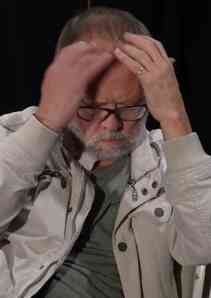
CZ
EN
EN





During the preparation of Tankred Dorst's play ‘I, Feuerbach’ at the Činoherní studio theatre in Ústí nad Labem, the magical element of theatre begins to spill over from the stage into real life, and the boundaries between the play and everyday reality disappear. The disputes between the characters in the drama give rise to conflict between the actors who portray them; the absence of an artistic director at the theatre and the absence of trustworthy authorities in the world make their situation unsolvable. The premiere does not take place, the actors part on bad terms, and the theatre director can do nothing about it. It seems that all the work on the production has been wasted. However, the theatre story gives rise to a film story, because film is capable of encompassing both lines of the ongoing plot: the line of theatrical fiction and the line of real life. Although it deals primarily with the fate and passion of actors, it also becomes a picture of a world in which people of different generations fatally pass each other by, in a situation where no boss or god gives instructions, corrects or judges our ability or inability to understand and communicate with each other.
